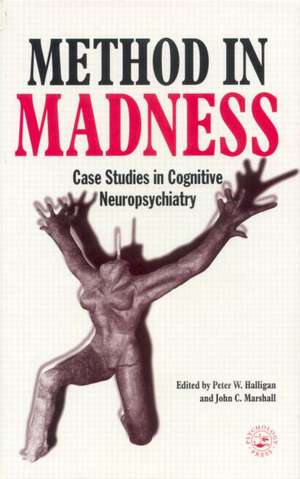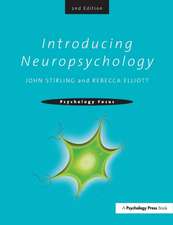Method In Madness: Case Studies In Cognitive Neuropsychiatry
Editat de Peter W. Halligan, John C. Marshallen Limba Engleză Paperback – oct 1996
Preț: 291.73 lei
Preț vechi: 516.32 lei
-43% Nou
Puncte Express: 438
Preț estimativ în valută:
55.83€ • 58.72$ • 46.65£
55.83€ • 58.72$ • 46.65£
Carte tipărită la comandă
Livrare economică 09-23 ianuarie 25
Preluare comenzi: 021 569.72.76
Specificații
ISBN-13: 9780863774423
ISBN-10: 0863774423
Pagini: 320
Dimensiuni: 156 x 234 x 24 mm
Greutate: 0.59 kg
Ediția:1
Editura: Taylor & Francis
Colecția Psychology Press
Locul publicării:Oxford, United Kingdom
ISBN-10: 0863774423
Pagini: 320
Dimensiuni: 156 x 234 x 24 mm
Greutate: 0.59 kg
Ediția:1
Editura: Taylor & Francis
Colecția Psychology Press
Locul publicării:Oxford, United Kingdom
Public țintă
ProfessionalCuprins
Section A: Introduction. J.C. Marshall, P.W. Halligan, Towards a Cognitive Neuropsychiatry. E. Weinstein, Reduplicative Misidentification Syndromes. Section B: Who Are You? H.D. Ellis, T.K. Szulecka, The Disguised Lover: A Case of Frégoli Delusion. P.W. Burgess, D. Baxter, M. Rose, N. Alderman, Delusional Paramnesic Misidentification. H.D. Ellis, K.M. Leafhead, Raymond: A Study of an Adult with Asperger Syndrome. Section C: Who am I? A.P. McKay, P.J. McKenna, K. Laws, Severe Schizophrenia: What is it Like? A. David, R. Kemp, L. Smith, T. Fahy, Split Minds: Multiple Personality and Schizophrenia. A.W. Young, K.M. Leafhead, Betwixt Life and Death: Case Studies of the Cotard Delusion. A.J. Parkin, The Alien Hand. Section D: Where Was I? C. Luzzatti, R. Verga, Reduplicative Paramnesia for Places with Preserved Memory. S.D. Sala, R. Freschi, F. Lucchelli, S. Muggia, H. Spinnler, Retrograde Amnesia: No Past, New Life. Section E: What Do I Believe? P.W. Halligan, J.C. Marshall, The Wise Prophet Makes Sure of the Event First: Hallucinations, Amnesia and Delusions. C. Cahill, C. Frith, False Perceptions or False Beliefs? Hallucinations and Delusions in Schizophrenia.
Recenzii
Method in Madness is a splendid and valuable addition to the neuropsychology literature. Its imaginative use of clinical case studies makes the subject live and throb with the dynamic complexities of the inter-relationship of psychological and physical processes. The various contributors have lived up to the requests of the editors to "paint pictures of individual people" and their creativity has resulted in something quite unique - a marvellously readable and provocative text and a challenging overview of one of the most exciting and puzzling areas of medical science. I am sure the book will be enormously successful. - Anthony Clare, St. Patrick's Hospital, Dublin
I greatly enjoyed reading through this extremely useful book. There is still a lack of material suitable for introductory and graduate courses in psychiatry which covers cognitive neuropsychiatry. In the Decade of the Brain, a book like this is therefore highly welcome as it goes a long way in providing bridges between the mental and the physical realm. The treatment of psychiatric and neurological disorders within one general unified framework facilitates discussions between specialties and opens interdisciplinary dialogues. - Manfred Spitzer, University of Heidelberg
The book deserves the success it will surely have. I can imagine using it as a basis for the final year undergraduate seminar, it will be standard reading for neuropsychologists. - John Morton, Cognitive Development Unit, London
I like the way that the use of case studies in this book has illuminated and humanised the theories of cognitive neuropsychiatry. It has enabled the various contributors to tailor their discussions to take account of the complex psychopathology that leads to mental symptoms in an individual...The book will appeal to a variety of audiences including undergraduate students studying abnormal psychology, also psychologists, neurologists and psychiatrists looking after people with behavioural problems and psychiatric illness. In addition, the book could be targeted at a larger lay audience; the use of case histories enables a naive person quickly to have a good idea of the issues under discussion. - Simon Fleminger, London Hospital Medical College
I greatly enjoyed reading through this extremely useful book. There is still a lack of material suitable for introductory and graduate courses in psychiatry which covers cognitive neuropsychiatry. In the Decade of the Brain, a book like this is therefore highly welcome as it goes a long way in providing bridges between the mental and the physical realm. The treatment of psychiatric and neurological disorders within one general unified framework facilitates discussions between specialties and opens interdisciplinary dialogues. - Manfred Spitzer, University of Heidelberg
The book deserves the success it will surely have. I can imagine using it as a basis for the final year undergraduate seminar, it will be standard reading for neuropsychologists. - John Morton, Cognitive Development Unit, London
I like the way that the use of case studies in this book has illuminated and humanised the theories of cognitive neuropsychiatry. It has enabled the various contributors to tailor their discussions to take account of the complex psychopathology that leads to mental symptoms in an individual...The book will appeal to a variety of audiences including undergraduate students studying abnormal psychology, also psychologists, neurologists and psychiatrists looking after people with behavioural problems and psychiatric illness. In addition, the book could be targeted at a larger lay audience; the use of case histories enables a naive person quickly to have a good idea of the issues under discussion. - Simon Fleminger, London Hospital Medical College
Notă biografică
Peter W. Halligan, John C. Marshall
Descriere
These cases should serve to reduce the discrepancy between the formal representations of psychiatric illness in the mainstream literature and the reality of people struggling to make sense of their own predicament .













